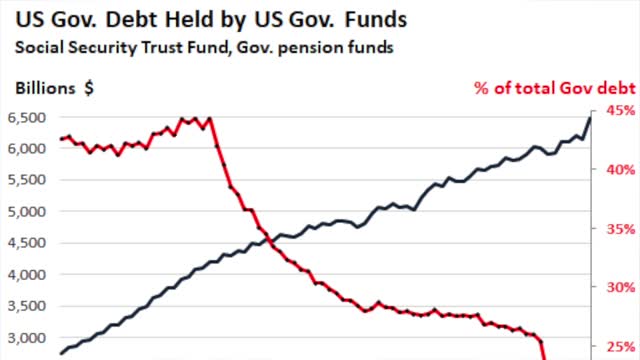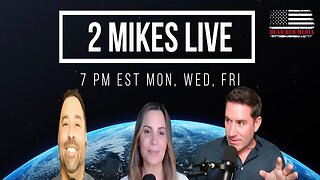Premium Only Content

30 TRILLION NATIONAL DEBT
WHO IS HOLDING ALL THIS DEBT?
The U.S. national debt exceeded $30 trillion for the first time, reflecting increased federal borrowing during the coronavirus pandemic.
Total public debt outstanding was $30.01 trillion as of Jan. 31, according to Treasury Department data released Tuesday. That was a nearly $7 trillion increase from late January 2020, just before the pandemic hit the U.S. economy.
The total debt comprises debt held by the public and intragovernmental debt. The debt milestone comes at a time of transition for U.S. fiscal and monetary policy, which will likely have implications for the broader economy. Many of the federal pandemic aid programs authorized by Congress have expired, leaving Americans with less financial assistance than earlier in the pandemic.
Quick Rise
U.S. debt has increased by nearly $7 trillion since the start of the Covid-19 pandemic.
U.S. total public debt outstanding, daily
Source: Treasury Department
Meanwhile, the Federal Reserve has signaled it could soon begin to raise short-term interest rates from near zero in an effort to curb inflation, which is at its highest level in nearly four decades.
“This is a jaw-dropping number that is a real cause for concern,” said Maya MacGuineas, president of the nonpartisan Committee for a Responsible Federal Budget. “It is the result of both borrowing for really important crises, most notably the Covid pandemic, but also trillions and trillions of borrowing for no reason other than politicians have stopped being willing to pay the bills.”
Congress during the Trump and Biden administrations authorized trillions of dollars in spending for pandemic programs aimed at supporting small businesses, unemployed workers, families with children, renters, and other groups. Those programs included the expanded child tax credit, enhanced unemployment benefits, and the Paycheck Protection Program.
The Treasury Department declined to comment on the public-debt milestone.
“In responding to the downturn in the economy induced by the pandemic, we felt and I strongly believe that it was appropriate to engage in spending that wasn’t financed by tax increases,” Treasury Secretary Janet Yellen said at the World Economic Forum last month.
“It’s important to evaluate debt sustainability in the context of the interest-rate environment,” she said, adding that the interest burden of U.S. debt is “very manageable” because of low-interest rates.
The national debt of the United States is the total unpaid borrowed funds carried by the federal government. [4] Government debt increases as a result of government spending, and decreases from tax and other revenues. Both of these fluctuate during the course of a fiscal year.
The national debt of the United States is the total national debt owed by the federal government of the United States to Treasury security holders. The national debt at any point in time is the face value of the then-outstanding Treasury securities that have been issued by the Treasury and other federal agencies. The terms "national deficit" and "national surplus" usually refer to the federal government budget balance from year to year, not the cumulative amount of debt. In a deficit year, the national debt increases as the government need to borrow funds to finance the deficit, while in a surplus year the debt decreases as more money is received than spent, enabling the government to reduce the debt by buying back some Treasury securities. In general, government debt increases as a result of government spending and decreases from tax or other receipts, both of which fluctuate during the course of a fiscal year. There are two components of gross national debt:
"Debt held by the public" – such as Treasury securities held by investors outside the federal government, including those held by individuals, corporations, the Federal Reserve, and foreign, state, and local governments.
"Debt held by government accounts" or "intragovernmental debt" – is non-marketable Treasury securities held in accounts of programs administered by the federal government, such as the Social Security Trust Fund. Debt held by government accounts represents the cumulative surpluses, including interest earnings, of various government programs that have been invested in Treasury securities.
Historically, the U.S. public debt as a share of gross domestic product (GDP) increases during wars and recessions and then subsequently declines. The ratio of debt to GDP may decrease as a result of a government surplus or via growth of GDP and inflation. For example, debt held by the public as a share of GDP peaked just after World War II (113% of GDP in 1945) but then fell over the following 35 years. In recent decades, aging demographics and rising healthcare costs have led to concern about the long-term sustainability of the federal government's fiscal policies.[3] The aggregate, gross amount that Treasury can borrow is limited by the United States debt ceiling.
-
 1:14:04
1:14:04
NONCONFORMING-CONFORMIST
11 months agoYOU HAVE TO PAY A LOT AND IN SO MANY WAYS TO TAKE PART IN THIS WORLD
502 -
 1:29:23
1:29:23
Redacted News
4 hours agoWW3 ALERT! Europe pushes for war against Russia as Trump pushes peace and cutting off Zelensky
86.3K194 -
 LIVE
LIVE
Dr Disrespect
8 hours ago🔴LIVE - DR DISRESPECT - PUBG - 5 CHICKEN DINNERS CHALLENGE!
2,237 watching -
 57:56
57:56
Candace Show Podcast
7 hours agoHarvey Speaks: The Project Runway Production | Ep 1
81.8K46 -
 DVR
DVR
LFA TV
1 day agoEurope’s Relationship With America Is Over | TRUMPET DAILY 3.3.25 7PM
6.93K3 -
 LIVE
LIVE
Quite Frankly
5 hours ago"European Deth Pact, Blackout Data Breach, More" ft. Jason Bermas 3/3/25
1,131 watching -
 LIVE
LIVE
2 MIKES LIVE
2 hours ago2 MIKES LIVE #187 Deep Dive Monday!
149 watching -
 44:25
44:25
CatfishedOnline
4 hours ago $0.69 earnedRacist Lady Shocked After Sending Money to a Nigeria Romance Scammer
15.5K3 -
 56:45
56:45
VSiNLive
3 hours agoFollow the Money with Mitch Moss & Pauly Howard | Hour 1
41K -
 2:28:18
2:28:18
Nerdrotic
6 hours ago $5.01 earnedOscars Aftermath | Super Chat Square Up - Nerdrotic Nooner 469
54.6K13